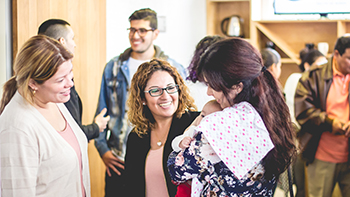
“No man (or woman) is an island.” So go the opening lines of the 400-year-old poem by John Donne. It is a phrase often used to express the idea that humans do better when they live in community rather than in isolation.
Membership of a community can define us as individuals. To suggest that a person is a member of a community, for example the Australian community, a religious community, the Facebook community or an ethnic community, conveys something about who that person is. If we are members of a variety of communities then our identity might have different facets.
When we are defined by our community membership it can have both positive and negative consequences. These consequences seem to relate to the identity of the community. If the community has a positive standing within the broader community, there is a good chance that a member will also be regarded in a positive light. If, however, the community has had a shameful history, then those who are members might be regarded in a shameful manner also.
When a community has a negative profile, it is not surprising that members of that community may struggle with maintaining their membership. For example, if you were the member of a football club whose players displayed thuggish behaviour, were involved in illicit drug-taking or constantly lost games, you may not want people to know that you are a member of that sport community. This can be challenging for members who are passionate about the real reason for the existence of the community – in this case football – but who feel embarrassed to be seen as part of a community with such a poor reputation.
What should a person do if they find themselves in a situation where their reputation, or sense of self, is diminished due to their membership of a flawed community? How long should a member put up with behaviours that are contrary to their morals or sensibilities? Does walking away from a community actually help that community put away its bad behaviours? Maybe the answers to these questions depend on the core nature of the community and if enough people believe that the reason for the community is worth fighting for.
Have you ever thought of walking away from a community group that you are a member of? If you stayed, “why?”
Thoughts for the journey

In his book, Letter to a Suffering Church[1], Bishop Robert Barron writes about his own emotional journey of being a member of the Catholic community as it lived through the sexual abuse scandal. He describes the book as a “cry from the heart” to all those who feel “understandably demoralised, scandalised, angry beyond words, and ready to quit”.
Bishop Barron reminds those who are considering leaving the faith community that unfortunately there have been moments of scandal throughout the history of the Church. This doesn’t make it acceptable, but it is what happens when you have flawed members. He also speaks of the “treasure” to be found in “earthen vessels” (2 Cor 4:7). The treasure is Christ, and we are the earthen vessels that are “prone to breakage and cracking”.
Here at the Catholic Enquiry Centre, we often receive correspondence from Catholics who say they can no longer remain a member of the Catholic community because of the many atrocities that have taken place. If given the opportunity to spend some time with these people, we listen deeply to the reasons behind their desire to relinquish their “membership” of the Church. It can be a humbling experience to listen to their stories. There are also Catholics who have contemplated leaving, but believe it is better to stay and fight the injustices from within. They choose to focus on the many positives that the Church community offers, not the least being the person of Jesus.
Sometimes when I meet a person who has become a Catholic, I’ll ask them why they wanted to become a member of a community that has so many flaws. These people are not ignorant and nor do they deny what has happened in our Church. They are well-reasoned people who have investigated what is at the heart of the Catholic faith. They have been inspired by people within the community who are doing their best to live the true values of the faith and who show signs of what it means to have Christ in their lives. Or perhaps they are inspired by the many and varied ways in which the Church and its ministries contribute to the good of Australian society[2].
If you are reading this and you are no longer a practising member of the faith community, you are warmly invited to contact us if you feel a conversation would be helpful.
If you are considering joining the Catholic community, then focus on God and what God calls the Church to be. Focusing on the imperfect characters in the Church will most likely lead to disappointment.
Going Deeper
 There are more than 1,000 parish communities in Australia. Each parish is defined by a geographical boundary and usually contains a church or a building set aside for the gathering of the community.
There are more than 1,000 parish communities in Australia. Each parish is defined by a geographical boundary and usually contains a church or a building set aside for the gathering of the community.
While church buildings are important, and often places of architectural beauty, it is the gathering of the body of people – the community – which is essential.
Pope Francis in Evangelii Gaudium encourages parishes to be “a community of communities, a sanctuary where the thirsty come to drink in the midst of their journey, and a centre of constant missionary outreach”.[3]
The Sunday Mass has always been the central reason for Catholics to come together. Over the years, the number of people gathering each week has diminished. Some people say that they no longer need to go to “church” because they can say their prayers or be “religious” in private. While you can absolutely say your prayers and develop a relationship with God in the privacy of your own home, the truth is that we are called to be in a relationship with each other. Put another way, we are called to pray and worship God together and to look after each other.
That is because God, and the Church, believes that no person is an island.
Words: Sharon Brewer
Images: Island, Unsplash, Benjamin Behre. Lightstock
[1] Bishop Robert Barron, Letter to a Suffering Church: A Bishop speaks on the sexual abuse crisis, Word on Fire Ministries, 2019.
[2] Come and See, Australian Catholic Bishops Conference
[3] Evangelii Gaudium, Para 28.



